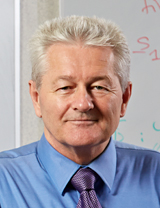
In his own words, Reinhard Laubenbacher, co-director of the UConn Health Center’s new Center for Quantitative Medicine, experienced an “academic midlife crisis” 11 years ago when his career path began to shift from mathematics to systems informatics and other applications to advance biomedical research.
An accomplished and internationally recognized mathematician and systems biologist, Laubenbacher now holds the first joint academic appointment with the Health Center and The Jackson Laboratory for Genomic Medicine.
“Joining the UConn Health Center and Jackson allows me to continue my migration to more applied research and to make a difference in the lives of patients,” he says.
While he still holds a deep appreciation for the “art of mathematics,” his focus now is implementing mathematical algorithms and related software to support research connected to biomedical problems, including genomic and other approaches to personalized medicine.
“There are three legs to our work,” Laubenbacher explains. “We begin by developing mathematical algorithms in systems biology; then implement those algorithms into software and, lastly, apply the software to help researchers looking at a specific biomedical question.”
“Dr. Laubenbacher has the right skill sets to support growth in systems biology and bioinformatics at the Health Center, especially as we embark on several collaborative research endeavors with our colleagues at The Jackson Laboratory for Genomic Medicine,” adds Dr. Frank Torti, the Health Center’s executive vice president for health affairs and dean of the UConn School of Medicine.
The non-profit Jackson Laboratory for Genomic Medicine brings together researchers, clinicians, pharmaceutical developers and other members of the bioscience community to discover the precise genomic causes of disease, develop individualized solutions and help build Connecticut’s bioscience industry. The organization, based in Bar Harbor, Maine, is building a new 189,000 square-foot research institute on the campus of the UConn Health Center in Farmington that will open in the fall of 2014.
“Biology is progressively becoming a quantitative science that requires mathematical strategies to unravel its secrets,” explains Dr. Edison Liu, president and CEO of The Jackson Laboratory. “Dr. Laubenbacher brings critical expertise and senior leadership to our efforts in genomic medicine. Reinhard will also be a catalyst for deep interactions between The Jackson Laboratory for Genomic Medicine and the University of Connecticut Health Center. We are absolutely thrilled to have him join us.”
Of the 30 principal investigators to be hired by 2020 at JAX Genomic Medicine, Laubenbacher is the first of 10 who will be jointly appointed with UConn.
“Through the new Center for Quantitative Medicine, we’re creating an intellectual home for quantitative approaches to medicine, bringing together areas such as quantitative biology, genomics, bioinformatics, biostatistics and biomedical informatics, in particular the analysis of large data sets. We will connect with clinical researchers to help drug development and testing efforts, using the broad range of expertise the center will assemble,” Laubenbacher explains. The other co-director, he says, will have more of a clinical or public health background and together, they will support a range of research initiatives.
Laubenbacher previously served as professor and director of education and outreach at the Virginia Bioinformatics Institute, part of Virginia Polytechnic Institute and State University (Virginia Tech). He was also a tenured professor in the Virginia Tech Mathematics Department, an affiliate faculty of biomedical engineering and sciences at Virginia Tech as well as Wake Forest University, and an adjunct professor in the Department of Cancer Biology at the Wake Forest University School of Medicine.
Before joining the Virginia Bioinformatics Institute – a pivotal change in his career direction – he was a professor of in the Department of Mathematical Sciences at New Mexico State University.
“I became interested in the history of mathematics, which led me to think more deeply about the contributions our own work makes to the lives of others,” he says of the motivation for his career shift.
At UConn, Laubenbacher is also a professor in the Department of Cell Biology, and an adjunct professor in the Mathematics Department on the Storrs Campus. He is continuing his research endeavors with Dr. Torti and is already establishing other collaborations on campus. But for now, his top priority is recruitment and team building for the new center. “With the right team and the right culture, we will create an environment where quantitative and clinical experts can collaborate effectively,” he adds.
Laubenbacher is a graduate of the University of Munich and earned advanced degrees in mathematics from Indiana University and Northwestern University. He has received numerous teaching and scholarly awards throughout his career, including a Fulbright Scholarship and becoming a fellow of the American Mathematical Society. In addition, Laubenbacher is widely published in scholarly journals in areas including computational biology, systems biology, mathematical foundations of computer simulation, and more.